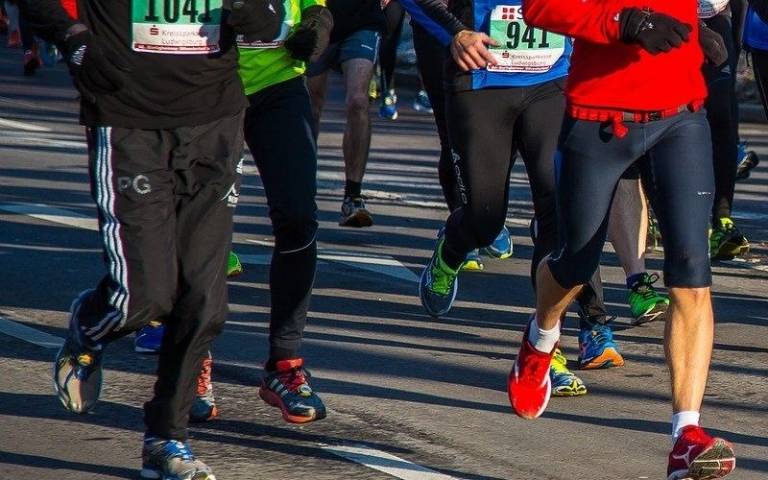Marathon running makes arteries younger and lowers blood pressure
7 January 2020
The new year means it’s time to set resolutions for 2020, and new research led by UCL and Barts Health NHS Trust suggests running a marathon for the first time could have several health benefits.

The study, published by the Journal of the American College of Cardiology, found that for first-time marathon runners, training and completion of the marathon resulted in reductions in blood pressure and aortic stiffening in healthy participants that were equivalent to a four-year reduction in vascular age. The greatest benefits were seen in older, slower male marathon runners with higher baseline blood pressure.
Dr Charlotte Manisty (UCL Institute of Cardiovascular Science & Barts Heart Centre) said: “As clinicians are meeting with patients in the new year, making a goal-oriented exercise training recommendation—such as signing up for a marathon or fun-run—may be a good motivator for our patients to keep active. Our study highlights the importance of lifestyle modifications to slow the risks associated with aging, especially as it appears to never be too late as evidenced by our older, slower runners.”
Arterial stiffening is a normal part of aging, but it also increases cardiovascular risk in otherwise healthy individuals by contributing to increased pulse pressure and ventricular overload, which are associated with dementia and cardiovascular and kidney diseases, even in the absence of plaque in the arteries. While blood pressure medication can modify arterial stiffness in established heart disease, more cardiovascular events occur in individuals without diagnosed high blood pressure.
Regular aerobic exercise is a lifestyle modification that has real-world implications, particularly with the growth in mass participation running as an increasingly popular form of non-prescribed exercise. The researchers used a group of 138 healthy, first-time marathon runners from the 2016 and 2017 London Marathon. They examined the participants before training and after marathon completion to determine if age-related aortic stiffening would be reversible with real-world exercise training.
Participants had no significant past medical or cardiac history and were not running for more than two hours per week at baseline. On average, participants were 37 years old and 49% were male. The researchers conducted all measurements before training started six months prior to the marathon and repeated them all within three weeks of completing the London Marathon, but no earlier than one week after the marathon to avoid any acute effects of exercise.
Assessments included blood pressure measurements and measurements of aortic stiffness by cardiovascular magnetic resonance imaging. Biological aortic age was determined from the relationship between the participant’s age and aortic stiffness at three levels of the aorta.
The average marathon running time was 5.4 hours for women and 4.5 hours for men. When compared to training data and marathon completion times from 27,000 runners, these times were found to be consistent with a training schedule of six to 13 miles per week.
Training decreased systolic and diastolic blood pressure by 4 and 3 mmHg, respectively. Overall, aortic stiffness reduced with training and was most pronounced in the distal aorta with increases in distensibility of 9%. This amounted to the equivalent of an almost four-year reduction in ‘aortic age’. Older patients had greater changes with exercise training, with males and those running slower marathon times deriving greatest benefit.
Dr Manisty added: “Our study shows it is possible to reverse the consequences of aging on our blood vessels with real-world exercise in just six months. These benefits were observed in overall healthy individuals across a broad age range and their marathon times are suggestive of achievable exercise training in novice participants.”
Although the study only recruited healthy participants, those with hypertension and stiffer arteries might be expected to have an even greater cardiovascular response to exercise training.
A seperate study led by Professor Alister Hart (UCL Department Department of Ortho and MSK Science, Royal National Orthopaedic Hospital) and published in BMJ Open Sport and Exercsie Medicine found that marathon running could also improve knee damage in middle-aged adults new to running. Professor Hart's team used high-resolution MRI to evaluate the short-term impact that long-distance running has on knee joints. They scanned 82 healthy participants’ knees six months before and two weeks after their first marathon.
Most of the participants already had some knee damage before they started training although they didn’t report any pain. For many people, the post-marathon scans revealed that running had done no further harm, and in fact, some main weight-bearing areas of the knee were improved. Some of the new runners experienced worsening of the knee joint, but this didn’t affect their performance.
The research improves understanding of how high-intensity exercise affects the knee and could persuade more non-runners to take up the sport and highlights areas of the knee that are more prone to injury – like the knee joint – so new and experienced runners can take this into consideration during their training.
The Marathon Study was funded by the British Heart Foundation, Cardiac Risk in the Young, and the Barts Cardiovascular Biomedical Research Centre.
The BMJ study was funded by Professor Hart’s patients, The Maurice Hatter Foundation, the RNOH Charity, the Rosetrees Trust and the Stoneygate Trust and supported by researchers at the National Institute for Health Research University College London Hospitals Biomedical Research Centre.
Links
- Dr Charlotte Manistry's academic profile
- British Heart Foundation
- UCL Institute of Cardiovascular Science
- The study in the Journal of the American College of Cardiology
- Professor Hart's Academic profile
- Professor Hart's paper in BMJ
Image
- Credit Pixabay
Media contact
Rowan Walker
Tel: +44 (0)20 3108 8515
Email: rowan.walker [at] ucl.ac.uk
 Close
Close

